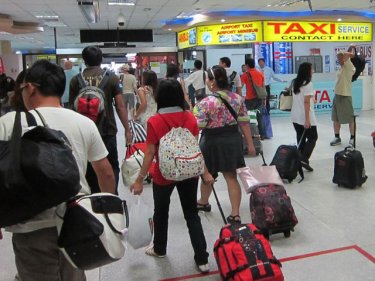PHUKET: Defending Bangkok's Suvarnabhumi International Airport from floodwaters and making sure Phuket keeps tourists coming are two of the keys to Thailand's swift economic recovery from a catastrophe that continues to grow in scale.
For the tourism industry, every day brings a global television news media deluge of negative reports about Bangkok.
Seldom does a talking head add the important qualifier: ''However, Suvarnabhumi airport, Bangkok's main flights hub, is operating normally. Phuket and other tourism destinations have been unaffected.''
On Thailand's Andaman Sea coast, the 2004 tsunami was all over in the space of a couple of hours. Once the water withdrew, recovery could begin. And it did.
This time, the same message needs to be out there, promoted at every opportunity: Thailand is seeking tourists, to speed the country's comeback.
Latest figures for Suvarnabhumi show a sharp dip in passenger traffic since October 24. This is being attributed to unbalanced media reports and national travel advisories.
Like the media reports, the advisories, often just as obsessed with the bad news, sometimes fail to provide a complete and accurate picture.
Things could be much worse. Direct flights especially ensure that Phuket is not suffering to the same degree as Bangkok.
Thai Hotels Association statistics for October are remarkably healthy, across the board:
For Phuket five-stars, occupancy in October hit 66 percent compared to 62.52 percent last year; for Phuket four-stars, occupancy rose to 74.41 compared to 65.33 percent; and for Phuket three-stars, it shot to 67.86 percent compared to 59.63 percent.
November is looking good, too, with the early figure already at 67 percent.
Suchart Hirankanokkul, President of the THA Southern Chapter, is encouraged by what he sees and hears. Phuket International Airport is handling about 147 flights in and out a day.
Apart from the shortage in essential foodstuffs that Phuket is undergoing because of ruptured supply lines, along with the rest of Thailand, the mood is good. So, generally speaking, is the weather.
There's still no reason why Phuket air passenger numbers will not top a record eight million for the 2011 calendar year, even if the latest statistics for October are unavailable because they were coming from the now-flooded Don Muang, Bangkok's second airport.
After the water recedes, Thailand will need to reconsider its economic game-plan. The lessons of the great floods of 1995 went unlearned.
Bangkok should never have continued to be the hub for Thailand's entire manufacturing economy.
One of the lessons already evident from the great flood of 2011 is that Phuket should have been Thailand's candidate for the 2020 World Expo.
With the vulnerability of Ayutthaya, the chosen site, clearly established, perhaps Phuket's suitability will now be reconsidered.
Phuket is also emerging as a suitable hub for IT-related future projects. With people from surrounding Asean countries now realising Phuket's potential, perhaps it's time Thailand did, too.










what do you mean by essential foddstuff shortage due to disruption in supply lines? which means there is no foodsupply in Phuket? how can the tourists, mostly avg.,tourist eat?
Posted by Sam123 on November 4, 2011 09:14
Editor Comment:
s-h-o-r-t-a-g-e: a deficiency in quantity. Not to be confused with nothing, nil, nada.